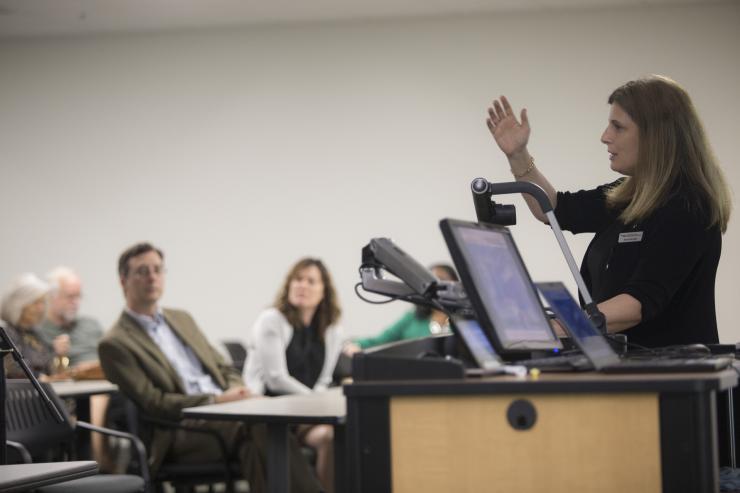Georgia Tech Launches Big IDEaS in Data Science
Apr 03, 2017 — Atlanta, GA

Georgia Tech's Institute for Data Engineering and Science (IDEaS), led by Co-Executive Directors Srinivas Aluru and Dana Randall, convened more than 100 members of the local data science community at its launch Wednesday in the Atrium of the Klaus Advanced Computing Building.
The event was set in motion by Executive Vice President of Research Steve Cross, whose welcome included a view of interdisciplinary research across Georgia Tech, and the rationale and value of the Interdisciplary Research Institutes (IRIs) like IDEaS. A series of short introductory presentations transitioned into a town hall conversation about opportunities, resources, and ways to engage. The evening ended with a celebratory reception and presentation of data-driven music provided by Mason Bretan, a Ph.D. student in the Center for Music Technology. The reception also included a presentation featuring the research of IDEaS-affilated faculty, centers, and institutes.
During the town hall, Randall introduced the IDEaS team, including the recently appointed associate directors David Sherrill (Chemistry and Biochemistry), Deirdre Shoemaker (Physics), and Marilyn Wolf (Electrical and Computer Engineering), and the newly formed IDEaS Faculty Council. Randall also talked about the role IDEaS will play in shaping research neighborhoods in the upcoming Coda Building.
"We want the community to engage with us and start a conversation about their data science needs--to create the next big idea in data science with us," Randall said.
Aluru gave an overview on how the Institute is composed, and of its motivation, goals, and affiliations with centers dedicated to data science foundational research and applications. IDEaS is also closely allied with the South Big Data Hub, with Aluru (as the hub PI) and Renata Rawlings-Goss (as the hub co-executive director) serving in leadership roles for both entitites.
Aluru discussed IDEaS's progress to date, including three industry-academia-bridging workshops in the areas of materials and manufacturing, analytics and machine learning, and precision medicine. A fourth upcoming workshop at Georgia Tech on April 26-27 will concentrate on IoT for smart and connected cities and campuses.
Aluru summarized IDEaS's work developing collaborative proposals to date, and issued a call to mobilize for future strategic activities. Aluru and Randall called attention to upcoming activities such as several IDEaS mini-retreats: IDEaS in Research, IDEaS for the Future, a retreat on Data Science for Pediatrics (with the Pediatric Technology Center) on May 23, and a Retreat for Energy (with SEI) in early Fall. Other events include monthly networking gatherings, with the first of these scheduled for April 28 at 4 p.m.; Data Science modules, short courses, specialized training; and the IDEaS seminar series starting in the fall on Fridays from 3 p.m. to 4 p.m. IDEaS is also planning to launch the IDEaS Labs, and the IDEaS Data Repositories. Anyone interested in contributing to these efforts can contact the IDEaS team.
Rawlings-Goss, directory of industry partnerships, gave a synopsis of the IDEaS Industry Alliance Program. "We've had some early successes," she said. "For example, through our new Program to Empower Partnerships with Industry (PEPI) program, companies like United Healthcare and McKesson are paired with faculty for research, going on-site to target relevant problems and growing new working partnerships."
She also explained how IDEaS worked with Microsoft to become an executive partner and provided faculty resources as well as cloud support. Microsoft's gift to Georgia Tech included Microsoft Azure and funding for seed projects in Data Engineering and Science. Rawlings-Goss asked interested industry and faculty researchers to get involved by contacting her.
Nearly 130 people attended the days events, with about a quarter of those from industry.The event was planned by Shkina Halbert of IDEaS, with assistance from the College of Computing Event Coordinator Birney Robert. Robert, who is also a studio artist, crafted technology-themed artwork using an arrangement of surplus store circuit boards, wiring, and light bulbs, and used these as table centerpieces.
IDEaS unifies data science researchers and resources spanning all disciplines throughout Georgia Tech to take on grand challenges in data science. It strategically builds collaborations and supporting resources to stimulate foundational research in areas such as machine learning, high-performance computing, and algorithms and optimization. It identifies and unites researchers to pursue collaborative and ambitious funding opportunities, to drive research, and to evolve and promote data science education. IDEaS provides an accessible and stable means of navigating the vast landscape of data science research and opportunities internally, and externally as it connects to industry and other partners.
While the IRI was officially organized in summer 2016, the March 29 event marked the operational launch of IDEaS and the beginning of a new campus-wide conversation on data science research, partnerships, resources, and education.
The 12 Interdisciplinary Research Institutes (IRIs) of Georgia Tech are responsible for bringing together a mix of researchers – spanning colleges, departments, and individual labs – around a single core research area. IRIs also connect a large portfolio of basic and applied research programs, support world-class research facilities and laboratories, engage Georgia Tech students, and collaborate with government and industry research partners.
Jennifer Salazar
IDEaS Director of Communications and Grant Writing




